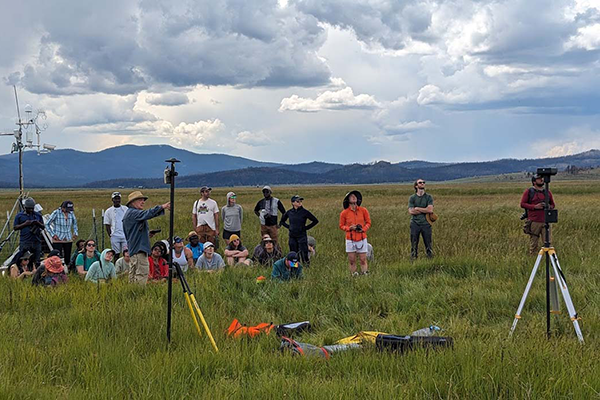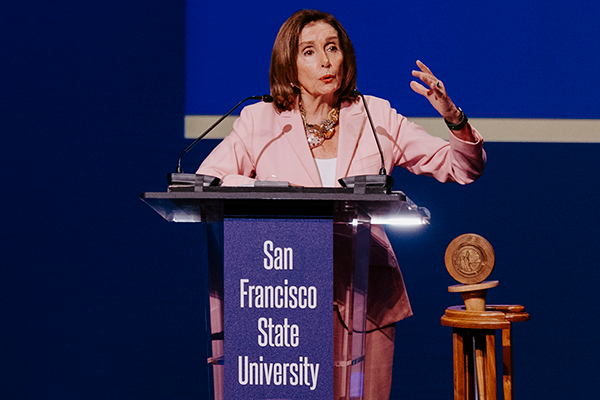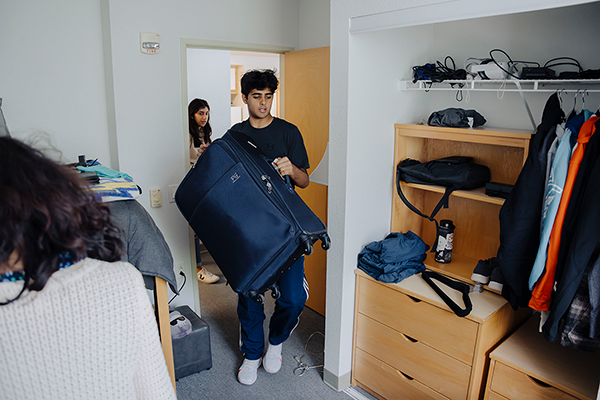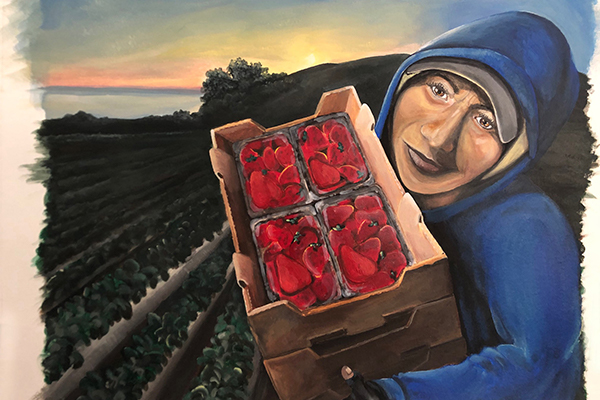News and Announcements

SF State’s College of Science & Engineering (CoSE) launched a new School of the Environment (SotE) to meet the evolving needs of students studying and researching environmental topics.
The new school merges CoSE’s departments of Earth and Climate Sciences and Geography and Environment with the Environmental Studies degree programs formerly in the School of Public Affairs and Civic Engagement. Three faculty from the programs will co-direct the new school until a new director is elected.
“It'll help us better serve our students because we’ll be able to work more collaboratively,” said Autumn Thoyre, one of three co-directors. “In the past, we’d have students who were interested in the environment but didn't know which degree or career path to follow. We can guide them more effectively with this change.”
The undergraduate and graduate degrees and certificates of the three programs will now be housed in SotE but will remain unchanged at the founding. The graduation requirements for students currently in, or those who have applied to, the three programs as of fall 2023 will be unaffected by the move. Over time, the school will continue to refine the degrees to best reflect the school’s mission and meet the needs of a wide-ranging and growing environmental workforce.
Merging the programs makes it easier for students to get the necessary advising to understand these different programs and find the one that best fits their interests. The new school will boost the faculty to student ratio and expand student opportunities. Students will have easier access to a larger variety of courses, scholarships and research experiences that were previously limited to one program. Some programs did not previously offer graduate degrees so SotE helps provide students a clearer path to master’s degrees.
The co-directors also look forward to starting fresh and building the school from the ground up. It’s an opportunity to better incorporate social justice into the fabric of this school and build a stronger and more diverse environmental workforce, they explain.
“It's an opportunity to say we're going to put this at the forefront and at the foundation of what we're building. Let’s think about equity and justice and building a welcoming community. That's really different,” said SotE Co-Director Andrew Oliphant.
In the upcoming years, SotE hopes to evaluate current programs to establish new opportunities to meet the evolving needs for students’ academic and professional development.
“Bringing together students and faculty from these different programs will create opportunities for interdisciplinary collaboration that will lead to exciting research possibilities and new career pathways for SF State students,” said SotE Co-Director Mary Leech. But the co-directors also acknowledge that there’s a lot of environmental work happening outside of SotE or any one college. They hope the new school will help build collaborations across this community and be another conduit for enhanced student opportunities.
For more information about this change, visit the School of Environment’s website.

Speaker Emerita Nancy Pelosi was a surprise guest at SF State’s Opening Convocation on Aug. 17, taking part in the ceremonial tradition welcoming faculty and staff to a new year on campus.
Pelosi began her speech in McKenna Theatre by acknowledging the vital roles of University employees.
“We have to make sure we are paying our workers well as we sing our praises,” Pelosi said in front of an audience of hundreds. “We want to make sure we respect them.”
She also praised SF State for its dedication to social justice and democracy.
“Right now, we have to make sure with all of the challenges that are out there to our democracy and democracy worldwide, that we make decisions that our flag is still there, with liberty and justice for all. San Francisco State is about all of that,” Pelosi said. “So I’m proud to bring you greetings from the Congress with respect for you, for the students, for the families, with gratitude to all of you. And just one last thing: Go Gators!”
Pelosi was not the only elected official in attendance. Two members of the San Francisco Board of Supervisors, Rafael Mandelman and Shamann Walton (MPA, ’10), were also on hand.
Mandelman said he is optimistic that today’s college students will graduate prepared to face the myriad challenges in society.
“I, and the city and county of San Francisco, are grateful that you all have chosen to prepare to lead the students here into that non-dystopian future that we all hope remains achievable,” Mandelman said.
Walton said he is proud to not only have graduated from SF State himself, but also to be the parent of two Gator alumni. He discussed the value of education as “the No. 1 thing that can never be taken away from us.”
“As Malcolm X said, ‘Education is the passport to the future, for tomorrow belongs to those who prepare for it today,’” Walton said. “Your work this year and continuing, of course, is preparing the brightest minds for success ... and [to] change the world.”
In her remarks, SF State President Lynn Mahoney highlighted SF State’s dedication to focusing on students.
“I am deeply proud of the ways in which San Francisco State serves as a model of excellence in innovation in teaching, academic innovation and research,” Mahoney said. “Strengthening student learning is a priority for all here.”
Mahoney also noted the University remains committed to eliminating equity and opportunity gaps among underrepresented populations.
“The greatest demonstration of our commitment to social justice starts here,” she said. “It starts at home by increasing the success of our students, especially our Black, Latinx, low-income and first-generation students.”
Other speakers included: Provost and Vice President of Academic Affairs Amy Sueyoshi, Professor of Biology and Academic Senate Chair Michael A. Goldman, Associated Students President Ersa Rao, California Faculty Association SF State Chapter President Brad Erickson, Staff Council Chair Dylan Mooney and CSU Employees Union SF State Chapter President Sandee Noda. The deans of SF State’s academic colleges and the University librarian introduced 34 new tenure-track faculty members.
Convocation also featured an awards ceremony honoring distinguished faculty and staff, presented by Neda Nobari (B.S., ’84), board chair of the SF State Foundation. This year’s winners:
- Excellence in Teaching (Tenured): Paul Beckman, Information Systems
- Excellence in Teaching (Lecturer): Mohammad HajiAboli, Engineering
- Excellence in Professional Achievement (Tenured): Dianthe “Dee” Spencer, Theatre and Dance
- Excellence in Service (Tenured): Nancy Gerber, Chemistry and Biochemistry
- Excellence in Service (Staff): Phonita Yuen, Metro College Success Program
A breakfast reception outside of the Creative Arts building preceded the Opening Convocation. More refreshments were served following the event at a resource fair on the patio outside of the Fine Arts building featuring campus programs and organizations.

As SF State geared up for the 2023 – 2024 academic year, set to begin Monday, Aug. 21, thousands of students came to campus for Move-In Day Aug. 11 and 12. Around 4,500 students will be living on campus this fall — one of the highest numbers ever for the University thanks partially to Manzanita Square, a 170-unit mixed-use residential center that became home to hundreds of students in 2020. (And 750 more on-campus beds are on the way courtesy of the new residence hall under construction on the West Campus Green.)
San Francisco State will have more than 20,500 students for the fall semester: approximately 5,500 new and 15,000 returning. The University is helping them get into the swing of the semester with GatorFest!, a series of more than 40 events aimed at helping students connect with peers, explore campus and have fun.
“Fall is my favorite time of year on campus because the entire community comes together to welcome our newest student scholars into our academic family,” said Miguel Ángel Hernández, SF State’s associate vice president for student life and dean of students. “Our welcome process extends beyond move-in weekend. Over the next eight weeks, all students will have the opportunity to engage, connect and share space intentionally designed for students to feel like they belong at SF State! I encourage everyone on campus to visit our GatorFest 2023 website to see upcoming events and programs. I am excited to continue meeting students during these events.”
Reconnecting with friends is what Madison, a transfer student originally from Burbank, says she’s looking forward to most in the weeks ahead. She enrolled at SF State because she’d already fallen in love with living in San Francisco but discovered that degree programs in her field of interest — fashion design — are hard to find at other area schools. (SF State offers a B.S. in Apparel Design and Merchandising.)
“I’m excited to see my friends again because I miss them a lot,” she said. “We’re from different places across the country, so when we come together here we can see each other again.”
Academics and SF State’s unique campus community were top draws for new student Taylor, too.
“I’m in more of a liberal arts field — English with a concentration in Linguistics. So I knew this school was really good for that on top of the diversity that the school promotes,” she said. “I’m not really used to that from the city I’m from. So I was very attracted to that aspect of it. Plus knowing people who go here who’ve had a great experience made it really easy to be like, ‘O.K. SFSU is where I’ll be.’”

While essential workers were acknowledged in the COVID-19 pandemic, a new student-curated exhibition at SF State celebrates farmworkers and builds awareness of their continuing inhumane working conditions.
“Essential” is open Tuesdays – Fridays from noon to 4 p.m. through Saturday, Sept. 2, in the Fine Arts Gallery (Fine Arts 238). Admission is free.
As guest curator, student Brianna Montserrat Miranda has crafted a mix of contemporary art and poetry exploring relationships between labor, injustice, family and community. The nine artists include SF State alumnus Juan R. Fuentes, contributing a woodblock print titled “Mayan Warrior.” Other artists are: Wesaam Al-Badry, Abiam Alvarez, David Bacon, Hannah Baldrige, caleb duarte, Juan R. Fuentes, Ricardo Ruiz, Christie Tirado, Arleene Correa Valencia. Historic works from the SF State Labor Archives and Resource Center will also be on display.
Miranda hopes that “Essential” makes people more mindful of the labor involved before produce makes it to the grocery store.
“I want our voices, our struggle and our experiences to be heard and respected,” she said.
Miranda, an Art History major and Museum Studies minor, has deep family roots in agricultural work.
“I’m a first-generation Mexican American woman, born to parents who immigrated to the U.S. at a young age,” she said. “Both sets of my grandparents have at one point or another worked in farm labor, as well as my parents. In fact, my grandparents are still actively working — my grandpa in the fields and my grandma at a sorting factory.
“I also worked for a short while at a sorting factory, as have some of my relatives who are around my age,” Miranda added. “I’m from the Central Valley, where about 25% of the country’s food is produced — but most importantly, I’m from a small farming, low-income community that is often under-represented and overlooked.”
Each semester, students in Lecturer Kevin B. Chen’s “Exhibition Design” class create a proposal for an original exhibition, but this is the first time that the Fine Arts Gallery has selected one for its shows of professional, non-student artists.
“We have been so impressed with Brianna’s artistic sagacity and commitment to sharing lived experiences with our community at SF State, shedding light on the hard labor necessary to provide food on all of our tables,” Chen said. “Collaborating with her has been a highlight of the year!”
Sharon E. Bliss, the Fine Arts Gallery director, says she is excited for visitors to experience what came from Miranda’s vision: “Watching her bring ‘Essential’ to fruition — from planning meetings through studio visits with artists and working with essayist Marcial González and graphic designer Madeline Ko — has been an amazing journey, and now we’re just getting started with sharing it with a public audience.”
Major support for “Essential” is provided by the Zellerbach Family Foundation and the Andy Warhol Foundation for the Visual Arts.
“Receiving the opportunity to curate ‘Essential’ has definitely been the most pivotal moment I’ve had at SF State,” Miranda said. “I’m still a little shocked but most really grateful for the opportunity. I know how important this exhibition is for me, my family and the Latino/a/x community who have experienced the effects of the agriculture business in the U.S.”
Beginning fall 2023, Canvas will be the only learning management platform offered on campus. This follows a yearlong transition that began in summer 2022. All fall 2023 courses are available in Canvas, and iLearn will no longer be available for teaching.
Faculty still migrating their content from iLearn to Canvas will continue to have access to two years of past course material in iLearn. Please visit the SF State Canvas website for a detailed timeline on when iLearn is going away completely.
Need help transitioning your course or have general questions about Canvas? Academic Technology is here to help. Visit the Canvas page on the Academic Technology website for a full list of workshops and training opportunities, a link to book a one-on-one appointment with a Canvas specialist, and links to support guides and documentation.
The SF State Science, Technology and Society (STS) Hub is pleased to announce the 2023 – 2024 STS Faculty Fellows Program.
The STS Faculty Fellows Program offers SF State faculty working at the intersection of science and social justice the opportunity to join a community of engaged scholars for the academic year. Over the course of the year, STS Hub fellows will develop and share scholarship, collaborate on potential research projects, mentor advanced graduate students, and participate in shaping the future of the STS Hub. The program is funded by the National Science Foundation.
The STS Hub theme for 2023 – 2024 is “Viral Politics: From HIV to Covid-19.” Applications from across the SFSU colleges from faculty (tenure track and lecturers) with active research projects that engage with this theme. Faculty with a teaching or professional development interest related to the theme will also be considered. Accepted Fellows will receive a stipend of $1,000 to participate in the STS Hub. Priority will be given to applicants at the rank of lecturer and assistant professor, but all are welcome to apply. STS Hub Fellowship applications are due Friday, Sept. 15, at 11:59 p.m.
To learn more about the STS Faculty Fellows Program or participating in other STS Hub activities, please join the STS Hub Information Session on Monday, Aug. 28, 1-2 via Zoom. All faculty are also welcome to e-mail co-directors Martha Kenney and Laura Mamo.
The campus community is invited to meet the Alli Gator mascot during their debut 9 – 11 a.m. on Wednesday, Aug. 23, on Malcolm X Plaza. Refreshments will be served.
The Office of Faculty Affairs and Professional Development invites tenure-track faculty and associate professors preparing for promotion to participate in one of the following workshops this semester to help prepare for retention, tenure and promotion.
Todd Roehrman, associate dean of Faculty Affairs and Professional Development, will lead the retention workshops. Roehrman and the chair of the University, Tenure and Promotion and Committee will lead the tenure and promotion workshops.
Faculty who will be reviewed in the next few years are encouraged to attend. The workshops have been organized according to different phases of faculty professional development, but topics covered in each of the workshops will be similar, so feel free to attend the workshop that best fits your schedule.
Please RSVP to receive a link for the workshop of your choice. An invitation link will be sent to your SFSU e-mail address the day before the workshop.
Schedule:
- Friday, Sept. 1, 12:30 – 2 p.m.: Faculty preparing for second-year retention review
- Tuesday, Sept. 5, 3:30 – 5 p.m.: Faculty preparing for tenure and promotion
- Thursday, Sept. 7: 3:30 – 5 p.m.: Faculty preparing for any retention review
- Friday, Sept. 8: 2 – 3:30 p.m.: Faculty preparing for promotion to Professor
- Friday, Sept. 15: 1:30 – 3 p.m.: Faculty preparing for any retention review
Should you have questions or require additional information, please contact Roehrman.
The Academic Senate Faculty Affairs Committee and the Office of Faculty Affairs and Professional Development invite faculty preparing applications for a Leave With Pay (LWP) including sabbaticals (one semester/full pay and one year/half-pay) and Difference in Pay leaves (DIPs) to participate in an online Leave With Pay Application workshop on Wednesday, Sept. 6, 1 – 2:30 p.m. via Zoom.
Representatives from the committee and the office will lead the workshop. The session will be recorded and made available for those unable to attend.
SF State is partnering with other CSU campuses to provide workshops to employees.
The CSU Cross-Campus Collaboration Workshops provide a new unique opportunity to share professional development across the CSU.
Workshops include:
- Breath and Health
- Building Trust in the Workplace
- Exposing Hidden Bias
- Fueling for Success
- Happy Affordable Holidays
- Holiday Stress
- How to Get Your Child to College
- Onboarding and Offboarding Employees-Keys to Continuity
- Preparing Emotionally to Transition to Retirement
Visit the CSU Cross-Campus Collaboration Workshops page to view all workshops and register.
If you are interested in sharing your knowledge of a particular topic to the CSU collective, please submit a Professional Development service ticket to request time to review the specifics.
A Discover SF State Open House will be held on Saturday, Oct. 21, 9 a.m. to noon. This University-wide event is geared toward encouraging high school and community college students to apply for fall 2024 admission to SF State, as well for the campus community to provide a sneak peek of all that the University offers to students and their loved ones!
Ambassador opportunities will be announced soon. Please consider serving as a University ambassador to assist colleagues in making this a great experience for our guests and a great success for SF State!
SF State Spotlight
Long before teaching hip hop as a lecturer in Africana Studies, Dave “Davey D” Cook grew up in New York in the early days of the culture. In a recent in-depth interview on “The Brian Lehrer Show” on WNYC-FM, he recalls his first experiences with hip hop as a child in the 1970s.
“Nobody was thinking about records — or that records could even be made. Nobody thought that we would be here 30, 40, 50 years later talking about it,” Cook said. “It was just a coming-of-age for many people. It was an innocent time.”
Upon the 50th anniversary of hip hop, Cook was also quoted this month in a USA Today story about the classic Run-D.M.C. and Aerosmith collaboration, “Walk This Way,” from 1986.
“That Run-D.M.C. song was a swift kick,” Cook said. “People who didn’t know about rap before then started to check it out.”
On June 29, the Nob Hill Gazette features Critical Studies Assistant Professor Artel Great as one of several people in the Bay Area making news.
“The George and Judy Marcus Endowed Chair in African American Cinema Studies at San Francisco State has added another title to his long list of credits: the first-ever cultural critic-in-residence of the Museum of the African Diaspora,” the article began. “Black films of the 1970s and Great’s new book, ‘Black Cinema and Visual Culture: Art and Politics in the 21st Century,’ which he edited with Ed Guerrero, inspired the first two online series of talks and panels for MoAD.”
Elementary Education Lecturer Patricia Sullivan is an instructor at the the Pipeline for Black Early Childhood Educator pilot program, which is part of Mayor London Breed’s Dreamkeeper Initiative to invest in the city’s Black communities. In the pilot program’s two years, 62 students have earned associate teaching permits in early childhood education from City College of San Francisco and gone on to work in classrooms, start a child-care business or pursue higher degrees, KQED reports.
“For some students in classes that I teach at [SF State and City College], I’m the first Black professor they’ve ever seen,” Sullivan said in the story, published Aug. 14. “For this group, it was really important to not only show them that someone could be in higher education and be Black, but that, you know, this stuff is not as hard as you think.”
Sullivan holds three degrees from SF State: a B.A. in Psychology (2004), an M.A. in Early Childhood Education (2007) and an Ed.D. in Educational Leadership (2014).
If you hear a harmony of ribbits, it’s most likely from Pacific chorus frogs calling for mates. A feature in the summer 2023 issue of Bay Nature highlights research on the effects of noise pollution on mate-calling, led by Assistant Professor of Biology Alejandro Vélez Meléndez.
“Females will use these calls to make decisions about mating: Is this a male from my species? Is this a good, high-quality male?” Vélez Meléndez said. “They don’t want males be too close to them. They’re spacing themselves out in the pond. In some species they can assess if the other male is big or is small and try to avoid a fight.”
The article also follows graduate students Tarah Haslett and Carolyn Schwartz in the field, at Mori Point in Pacifica, and in the Vélez lab, on campus.
“Human noise pollution can very easily be overlooked when thinking about conservation since you can’t see it,” Haslett said. “You can’t go to a single ecosystem that hasn’t been affected by it.”
John Logan, professor and director of Labor and Employment Studies, remains a go-to faculty expert in the media. His recent commentary includes an ABC News story on Aug. 16 about union activity at Amazon by the Teamsters.
“Amongst other groups and younger people in the labor movement ... They are very enthusiastic about the idea about not only organizing Amazon, but that there’s a very powerful union that’s prepared to put resources into that,” he said. “But it hasn’t happened yet. So we don’t really know.”
A story in the San Francisco Examiner on Aug. 14 explores low voter turnout among non-U.S. citizens in San Francisco school board elections.
“When you have parents more involved in their kids’ classrooms and schools and the system in general, it improves education outcomes. The students do better,” Political Science Professor Ronald Hayduk said.
Burning Man returns to Black Rock City, Nevada, this month, and Geography and Environment Professor Andrew Oliphant will be on the playa measuring emissions, heat, vapor and more.
The annual festival creates a unique climatological phenomenon, where even breathing causes more pollution than cars in the hot desert air.
“It’s the only city I know where the transportation sector is one of the smallest contributors to carbon emissions,” Oliphant told 48 Hills on Aug. 10. “In fact, carbon contributions by the transportation sector are less than human respiration.”
SF State Magazine has been awarded a bronze in the alumni/general interest magazine category of the Council for Advancement and Support of Education (CASE) Circle of Excellence Awards. Each year, CASE — a global nonprofit dedicated to educational advancement — honors universities around the world for communications projects in a number of categories.
“SF State Magazine has been praised for its covers and effective environmental portraits that tell a story,” this year’s judges wrote on the award website. “It’s noted that the publication is a great way to showcase institutional pride. Photography is also praised as strong, which is an important aspect of any publication. The publication is doing a great job of presenting the institution and its people in an engaging and visually appealing way.”
In 2021, CASE judges named SF State Magazine the Robert Sibley Magazine of the Year.